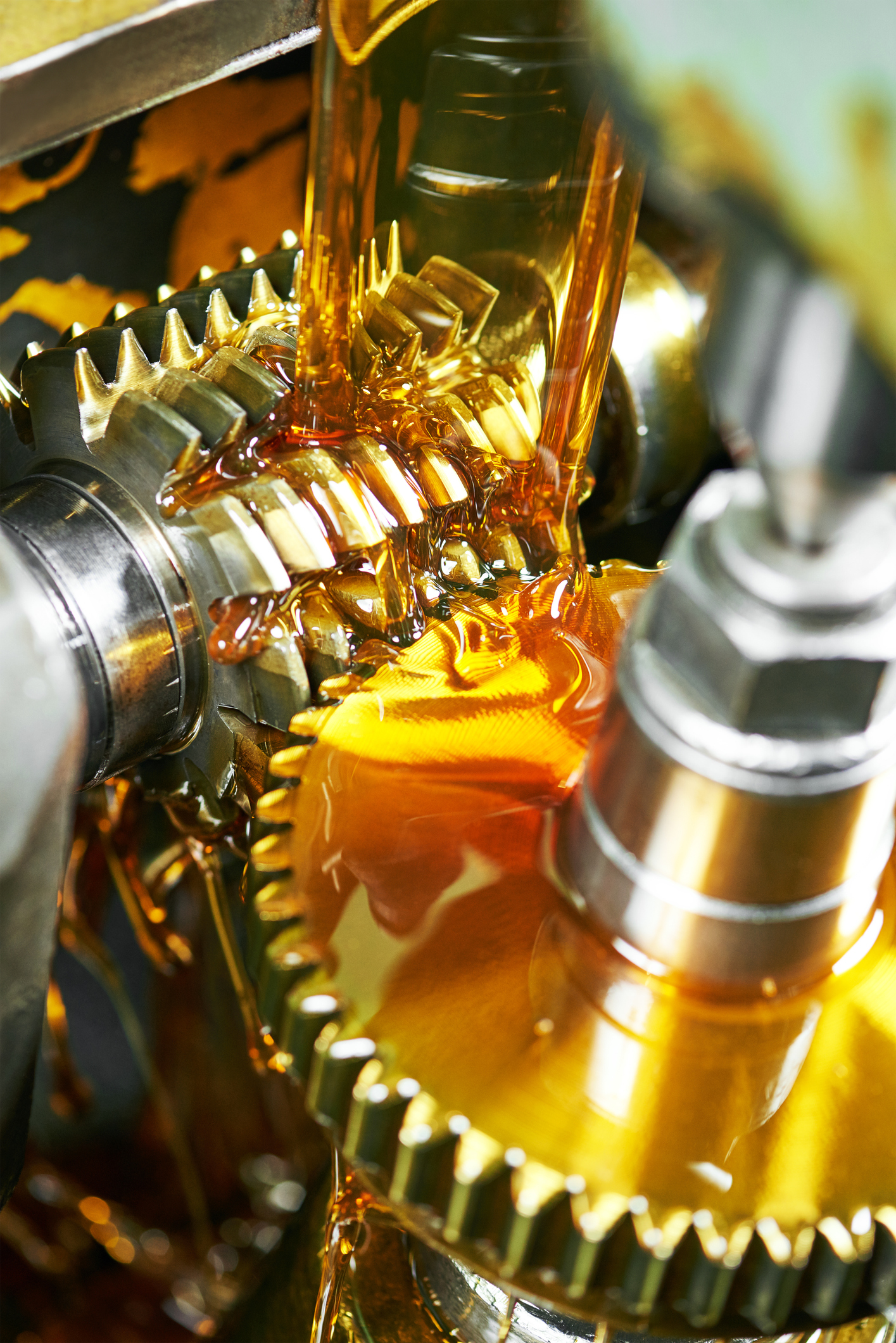
Article
Tribology Paves the Way for Greater Sustainability and Efficiency
- Dr. Mirjam Bäse
- August 04, 2021
- 6-min read
Day-to-day life can be full of friction, and no one knows that better than Dr. Mirjam Bäse, Tribology Specialist at Magna Powertrain in Lannach, Austria. She works in the Clutches, Decoupling and Oil Building Block within Driveline Systems. This team resolves issues with friction and wear of oil-cooled and oil-lubricated torque-transmitting clutch plates, and with the oil component itself. For this, knowledge about the science of tribology* is highly necessary.
Dr. Bäse’s main task as a Tribology Specialist is to provide the product development or product supervision teams with technical expertise within the problem-solving process. Since 2018, she has also been responsible for all types of platform oil development for the different Driveline Systems product lines.
The influence of tribology on Magna’s powertrain products is significant. “Jokingly, one could say that ‘Nothing works without tribology,’ because tribology is everywhere. In fact, we ourselves would slide through the world without the presence of friction. We could not transmit clutch torque without friction or oil, and friction reduction and any corresponding efficiency increases in gears or bearings would not be possible,” says Dr. Bäse.
The influence of tribology on Magna’s powertrain products is significant. “Jokingly, one could say that ‘Nothing works without tribology,’ because tribology is everywhere. In fact, we ourselves would slide through the world without the presence of friction. We could not transmit clutch torque without friction or oil, and friction reduction and any corresponding efficiency increases in gears or bearings would not be possible,” says Dr. Bäse.


*Tribology = from the Ancient Greek words “tribein” (rubbing) and “logos” (here: study of) – so the study of friction.
“The opposites of wanted and unwanted friction show just how complex it is to solve tribological issues. On one hand, we must ensure system performance and functionality throughout the entire system lifetime. And on the other hand, there are high requirements for the efficiency of our systems, and increases in efficiency can help drive CO2 reduction of our products. On top of that, despite increasing technical requirements, we need to keep development costs and unit prices low, so we can offer competitive products on the market.
Dr. Bäse explains that to address these conflicting requirements, a main objective is to improve efficiency in both traditional products, like transfer cases and axles, and electric drives for our etelligentDrive products. One way this is achieved is by using low-viscosity oils, which may have an impact on increased wear in the functional components, such as gears or rolling bearings. Renewed wear of the particles may cause clutch noise, vibration and harshness issues. To decrease the wear of the components, better or high-additive oils can be used, but using these may increase the likelihood of problems in the component and/or system performance, functionality and material compatibility, and they often come with a higher price. “This is an example of the complexity we face, and also shows why complete system development and integration into an automotive powertrain is so complex,” said Dr. Bäse.
In their day-to-day operations, Dr. Bäse and the team interact with suppliers and customers, and collaborate with many internal teams, including system engineering and cross-functional building blocks, and with Transmission Systems colleagues in Untergruppenbach, Germany. “Tribologists obviously can’t be experts in every field,” Dr. Bäse admits. “To answer a tribology question, it is important to think from the individual nanoscopic level of the friction-stressed contact of a component, all the way up to the complete system level, while collecting all available information from different areas of expertise and assembling them in a sensible manner. This makes working as a tribologist extremely interesting.
New requirements for sustainable, technical solutions increase complexity throughout a product’s entire life cycle. “We are facing major challenges not only in technical development, but also in many other areas, as well as socially and politically on a global scale,” explains Dr. Bäse. “However, I am personally 100% convinced that it is right and important to face this issue head on in every area. Tribological knowledge offers a part of the solution to such issues, and I am pleased to be able to contribute to increasing sustainability in the future with my work at Magna."
Dr. Bäse’s career in the automotive industry began 20 years ago, when she took on an apprenticeship as a mechanic so she could repair her converted VW LT 28 campervan. Not wanting to spend her whole life tinkering in a cold workshop, she decided to study mechanical engineering in her hometown of Magdeburg, Germany. It was through a student traineeship with the university Chair of Machine Elements and Tribology that she discovered her fascination for tribology and the study of friction.
Dr. Bäse spent several years at the university, studying and earning her doctorate. She became a professor of mechanical elements and tribology, before moving into the automotive industry. Magna was looking to fill an expert position in Lannach at the time, so she made the move to Austria in March 2017. Although she had not had any previous connection to Austria, she now says she cannot imagine living anywhere else.
Dr. Bäse explains that to address these conflicting requirements, a main objective is to improve efficiency in both traditional products, like transfer cases and axles, and electric drives for our etelligentDrive products. One way this is achieved is by using low-viscosity oils, which may have an impact on increased wear in the functional components, such as gears or rolling bearings. Renewed wear of the particles may cause clutch noise, vibration and harshness issues. To decrease the wear of the components, better or high-additive oils can be used, but using these may increase the likelihood of problems in the component and/or system performance, functionality and material compatibility, and they often come with a higher price. “This is an example of the complexity we face, and also shows why complete system development and integration into an automotive powertrain is so complex,” said Dr. Bäse.
In their day-to-day operations, Dr. Bäse and the team interact with suppliers and customers, and collaborate with many internal teams, including system engineering and cross-functional building blocks, and with Transmission Systems colleagues in Untergruppenbach, Germany. “Tribologists obviously can’t be experts in every field,” Dr. Bäse admits. “To answer a tribology question, it is important to think from the individual nanoscopic level of the friction-stressed contact of a component, all the way up to the complete system level, while collecting all available information from different areas of expertise and assembling them in a sensible manner. This makes working as a tribologist extremely interesting.
New requirements for sustainable, technical solutions increase complexity throughout a product’s entire life cycle. “We are facing major challenges not only in technical development, but also in many other areas, as well as socially and politically on a global scale,” explains Dr. Bäse. “However, I am personally 100% convinced that it is right and important to face this issue head on in every area. Tribological knowledge offers a part of the solution to such issues, and I am pleased to be able to contribute to increasing sustainability in the future with my work at Magna."
Dr. Bäse’s career in the automotive industry began 20 years ago, when she took on an apprenticeship as a mechanic so she could repair her converted VW LT 28 campervan. Not wanting to spend her whole life tinkering in a cold workshop, she decided to study mechanical engineering in her hometown of Magdeburg, Germany. It was through a student traineeship with the university Chair of Machine Elements and Tribology that she discovered her fascination for tribology and the study of friction.
Dr. Bäse spent several years at the university, studying and earning her doctorate. She became a professor of mechanical elements and tribology, before moving into the automotive industry. Magna was looking to fill an expert position in Lannach at the time, so she made the move to Austria in March 2017. Although she had not had any previous connection to Austria, she now says she cannot imagine living anywhere else.
We want to hear from you
Send us your questions, thoughts and inquiries or engage in the conversation on social media.
Related Stories
Stay connected
You can stay connected with Magna News and Stories through email alerts sent to your inbox in real time.